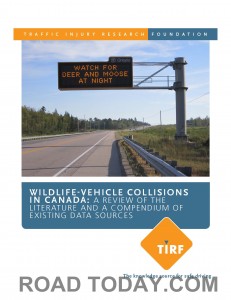TIRF, Eco-Kare and State Farm release findings regarding wildlife-vehicle collisions in Canada
 The Traffic Injury Research Foundation (TIRF) and Eco-Kare International have released the findings of their feasibility study to create a Canadian wildlife-vehicle collision clearinghouse. This study was made possible thanks to primary funding from State Farm and secondary funding from the Ontario Wildlife Foundation.
The Traffic Injury Research Foundation (TIRF) and Eco-Kare International have released the findings of their feasibility study to create a Canadian wildlife-vehicle collision clearinghouse. This study was made possible thanks to primary funding from State Farm and secondary funding from the Ontario Wildlife Foundation.
In stage one of the study, researchers summarized the available data sources on wildlife-vehicle collisions in Canada. Researchers found that the problem of such collisions in Canada is significant but that despite available data sources, data were too limited to accurately measure their impact.
Of equal concern, data about the species involved in these collisions were found to be lacking. Complete data with species and accurate locations could aid researchers in the development and efficient implementation of species-specific and effective measures to increase road user and wildlife safety in problem areas. For example, the change of season from winter to spring is a time when road safety professionals remind Canadian drivers to be aware of not only increased traffic volume but also increased wildlife on the roads. With the proper data, drivers could be provided region-specific information about the increased collision risk associated with seasonal movement patterns of wildlife across roads.
During the second stage of the study, researchers investigated the feasibility of creating a centralized clearinghouse and developed an action plan for its creation. Availability of data and resource materials, and expertise required to develop key components of the clearinghouse were also studied. It is the hope of researchers to see the creation of a nation-wide wildlife-vehicle collision clearinghouse with data and resources based on a long-term vision.